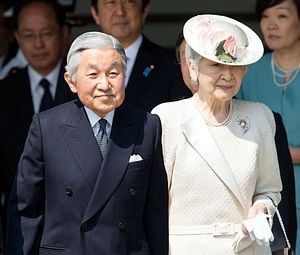Japanese Emperor Akihito’s August 15 remarks to commemorate the 70th anniversary of the unconditional capitulation of the Empire of Japan to the United States proved to be a “dagger rather than a sword” to quote John Delury from a recent exchange I had with him on Twitter.
While, Emperor Akihito expressed “deep remorse” for the war at a memorial service and “a deep and renewed sense of sorrow,” he did not openly attack the somewhat ambiguous August 14 statement of Japanese Prime Minister Shinzo Abe on the same subject – the latter’s remarks were filled with rhetorical twists and did not offer a new apology to Japan’s wartime victims.
Although the Japanese emperor is a mere figurehead and barred by Japan’s constitution from making any political statements, some observers expected a more forceful (but still subtle) critique of Shinzo Abe’s revisionist politics, with which Akihito apparently disagrees with (although it is uncertain to what degree).
Nevertheless, it was the first time that the emperor uttered the phrase “deep remorse” at the Nippon Budokan hall in Tokyo during the annual so-called “National Memorial Service for the War Dead.”
“Reflecting on our past and bearing in mind the feelings of deep remorse over the last war, I earnestly hope that the ravages of war will never be repeated,” Akihito said. “Together with all of our people, I now pay my heartfelt tribute to all those who lost their lives in the war, both on the battlefields and elsewhere, and pray for world peace and for the continuing development of our country.”
On August 15, 1945 Akihito’s father, Hirohito, announced in a radio broadcast Japan’s unconditional surrender. At the beginning of this month, the Imperial Household Agency released a refurbished recording of this radio broadcast (“Imperial Rescript on the Termination of the War”) based on the recommendation of the emperor and the empress.
Interestingly, the Imperial Household also released pictures and a video of the underground air-raid shelter where Hirohito made the “sacred” decision to capitulate. Emperor Akihito was 11 years old at the time and had been evacuated from Tokyo. His most vivid memory about returning to the capital was that of a city reduced to “completely burnt-out ruins, which stand out especially clearly in my memory.”
The subtle gesture of releasing the surrender speech of his father as well as pictures of the rundown bunker in which Hirohito finally admitted utter and complete military defeat can be seen as a clear indication of what Akihito thinks about Japan’s devastating wartime experience, as well as Shinzo Abe’s historical revisionism.
As my colleague Yuki Tatsumi already pointed out (See: “Why You Should Listen to What Japan’s Emperor Says on August 15”), the emperor has identified “four dates that should not be forgotten” by the Japanese people from the watershed year 1945: June 23 (the Battle of Okinawa), August 6 (the atomic bombing of Hiroshima), August 9 (the atomic bombing of Nagasaki), and August 15 (the end of the war).
“It is most important for us to take this opportunity to study and learn from the history of this war, starting with the Manchurian Incident of 1931, as we consider the future direction of our country,” Emperor Akihito already said during his 2015 New Year’s address. The Manchurian Incident was a pretext for the Japanese invasion of northeastern China in 1931.
In 1936, Nobusuke Kishi, Shinzo Abe’s grandfather, was sent to Manchuria to push for the industrialization of Japan’s de-facto colony with the help of Chinese forced labor. After the war he was arrested as an alleged Class-A war criminal and accused of playing an instrumental part in setting up Manchuria’s (back then known as Manchuko) wartime economy which was “designed to enable Japan to carry on an aggressive war.” Kishi, however, was never indicted and became Japan’s head of government in the 1950s. During his premiership, Kishi pushed for constitutional revision and rearmament but failed. Shinzo Abe appears to have taken up the family’s baton in both instances and it is his sense of family honor that perhaps has Emperor Akihito worried the most.

































